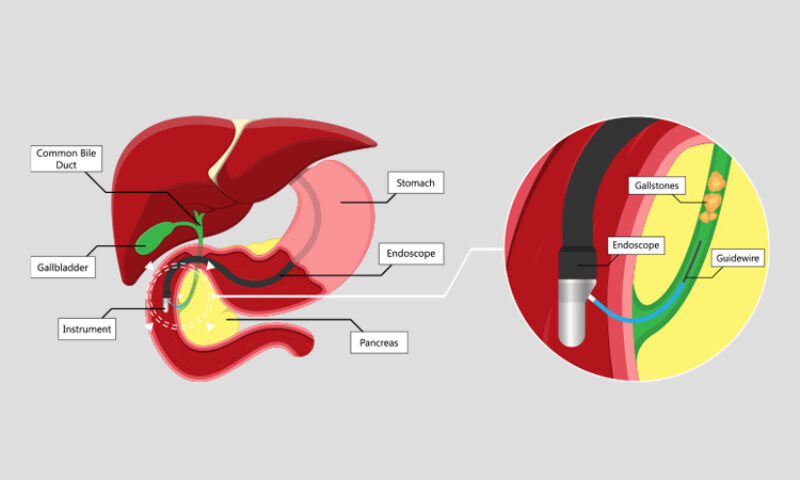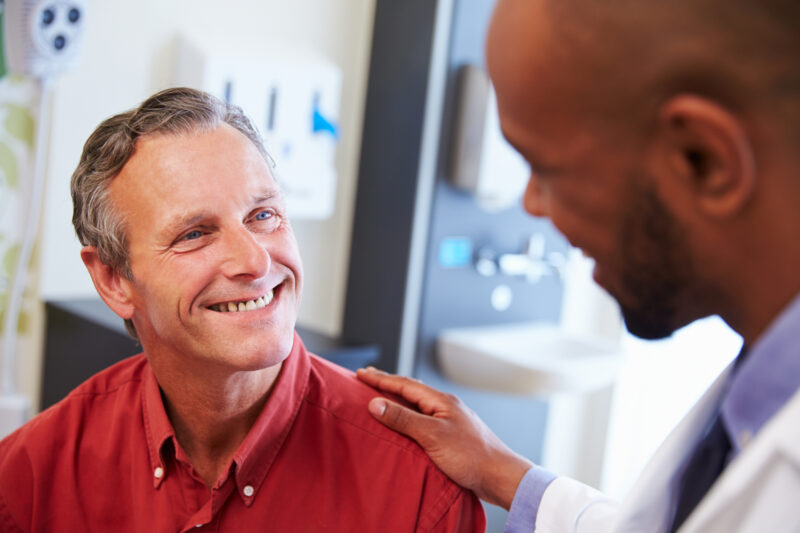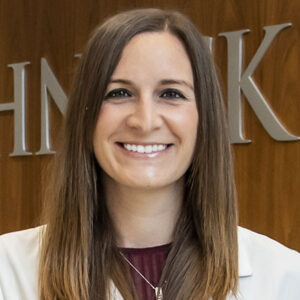
Endoscopic Retrograde Cholangiopancreatography (ERCP)
ERCP is a procedure that allows a doctor to diagnose and treat issues originating in the digestive system.
What is ERCP?
An endoscopic retrograde cholangiopancreatography (ERCP) is a procedure that allows a doctor to diagnose and treat issues originating in the digestive system.
The procedure involves guiding a thin, flexible tube called an endoscope through the mouth and down your esophagus. Patients typically remain awake during the procedure but are given sedatives that relax their body and throat in an effort to minimize their reaction to the insertion of the endoscope.
Once the endoscope is inserted, the doctor guides it through the esophagus and stomach until it reaches the duodenum (beginning of the small intestine). Then, a smaller catheter is passed through the hollow endoscope tube and used to inject a harmless dye through the bile ducts that lead to the pancreas and gallbladder.
The dye lines the bile ducts and coats any abnormalities such as tumors in a manner that makes them more visible in a subsequent x-ray. This part of the procedure allows the doctor to diagnose issues stemming from these areas much easier.
What Does ERCP Treat?
An ERCP is recommended for individuals experiencing symptoms of an issue stemming from the digestive tract and its organs. Stomach pain caused by tumors, stones, or lesions may cause a doctor to recommend an ERCP. Abnormalities such as yellowing skin (jaundice) and dark urine may also be reasons to carry out an ERCP.
Other common reasons for an ERCP include
- Gallstone disease
- Chronic pancreatitis
- Inflammation in the digestive tract
- Narrowing of the bile ducts
The ERCP procedure is often a preliminary step in the full diagnosis of digestive issues.

Preparing for Your ERCP Procedure
Your doctor will have specific instructions suited to your medical history. Patients with conditions such as diabetes will require special preparation. Be sure to disclose your full medical history to your doctor prior to your ERCP.
In general, most patients are required to:
- Not eat or drink anything except water 8 hours before the procedure
- Not smoke 8 hours before the procedure
- Notify their doctor of any current medications they are taking, especially blood thinners
- Notify their doctor of any existing allergies
Have questions about preparing for an ERCP at Schneck? Our gastroenterologists are world-class and highly qualified.
What to Expect After Your ERCP
The ERCP is an outpatient procedure, meaning it does not require an overnight stay at the hospital. The in-hospital recovery period will last up to 2 hours on average during which you may experience the onset of a sore throat due to the procedure. This is nothing to be alarmed about.
Due to the sedatives used, you are required to secure a ride home from another adult on the day of the procedure. You will not be allowed to leave the hospital without a caretaker.
Depending on your response to the procedure, you may be able to resume your regular activities the following day. If you experience any of the severe symptoms mentioned in the risks portion of this resource 72 hours after your procedure, please call your doctor immediately

ERCP Right Here At Schneck
Dr. Maurer is a board-certified general surgeon fellowship trained in minimally invasive surgery and advanced endoscopy, including ERCP.

Susan Maurer, MD
General Surgeon, da Vinci Surgery View Info »Risks Involved with the ERCP Procedure
ERCPs performed by qualified and experienced doctors do not often result in complications. Despite that, there are a few common risks that certain patients may experience.
Post-surgery symptoms such as severe abdominal pain, fever, and chills are signals of a possible complication. These symptoms, when persistent, may be an indication of pancreatitis. Acute pancreatitis after an ERCP is the inflammation of the pancreas due to the procedure. Despite only occurring in 2% to 15% of cases, pancreatitis is the most common and serious complication associated with an ERCP.
Other possible causes of complications include the removal of stones, tumors, or lesions that may cause inflammation of the bile ducts they were removed from. It is not uncommon to experience a sore throat or minor irritation in your mouth after an ERCP. These are not indications of a complication but instead a normal result of the insertion of the endoscope.
ERCP FAQs
No. Due to the sedatives used, you will be required to secure a ride home from a responsible adult.
Yes. You are required to fast 8 hours prior to your procedure.
An ERCP is typically carried out by a gastroenterologist. Schneck is please to have Dr. Maurer on staff who can perform the ERCP procedure for our patients.
ERCP At Schneck
Our team of gastroenterology providers are ready and able to walk you through what to expect for an ERCP procedure. With Schneck, you never have to face your health alone. Give us a call today to schedule a consultation and see if ERCP is right for you.
